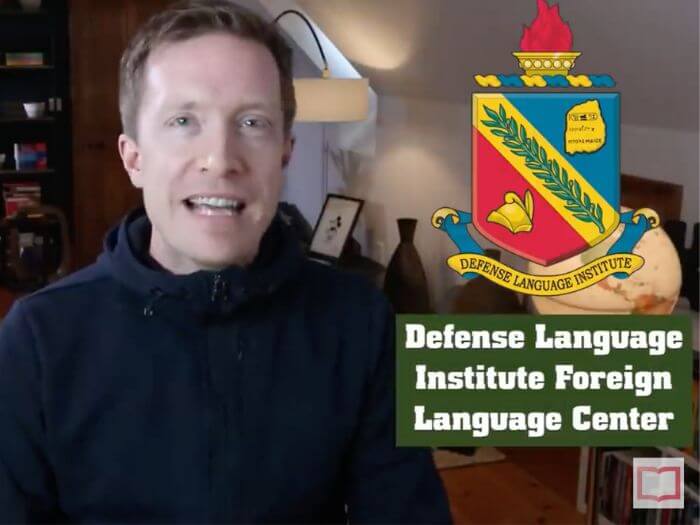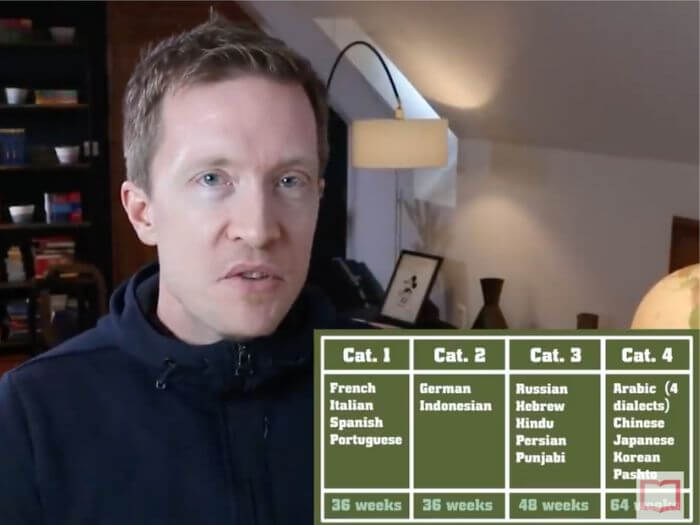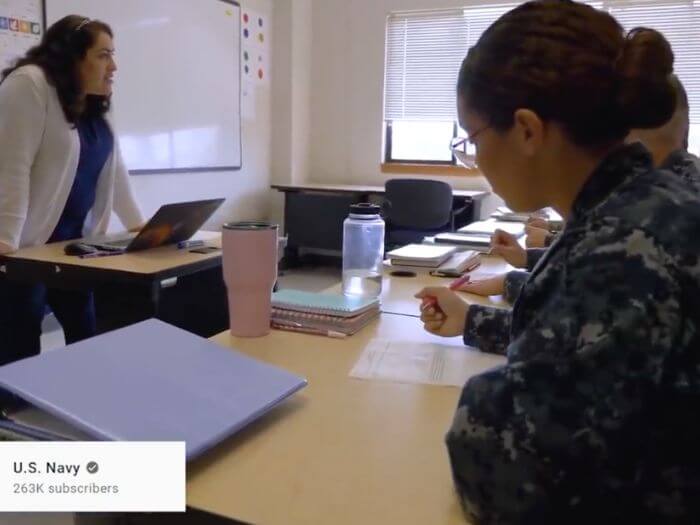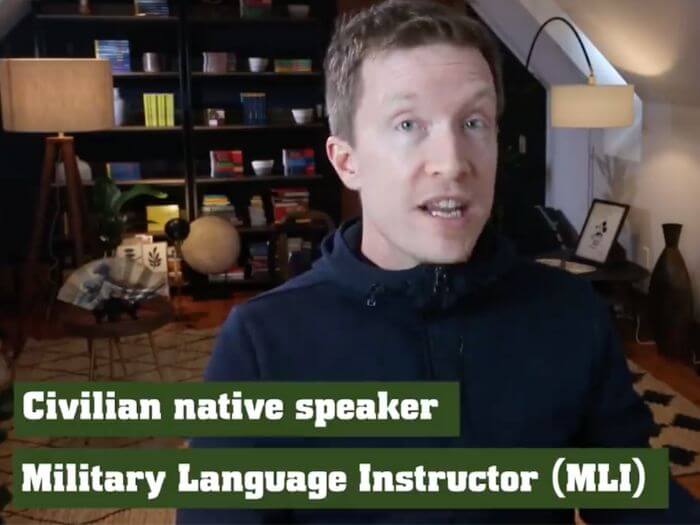What if being able to speak a second language was the difference between doing your dream job or not?
What if it was the only thing standing between life and death for you and countless others?
If you’re thinking, “Wow, Olly, let me at it!”, perhaps you’ve got what it takes to study at the United States of America’s Defense Language Institute in Monterey, California.
U.S military linguists are known for being among the fastest language learners in the world and they need to be good because in any number of intelligence-gathering or hostile situations knowing the local language can save lives.
But you're probably wondering just how US military linguists learn languages fast. Well, in this post, you'll get an exclusive behind the scenes inside look at their training and discover how they get fluent fast.
Pro Tip
By the way, if you want to learn a new language fast, without joining the military (!), my top recommendation is StoryLearning®, a fun and effective method that gets you fluent thanks to stories, not rules. Find out more and claim your free 7-day trial of the course of your choice.
If you prefer watching videos, hit play on the video version of this post below. Otherwise, keep scrolling to find out how US military linguists learn languages fast.
What Is The DLI?
The military’s Defense Language Institute Foreign Language Center— DLIFLC or DLI for short – is the biggest and most effective foreign language school in the USA. In fact, more than 3500 students pass through its classrooms every year.
Now it’s not the only military language school in the US. There’s a smaller DLI campus in Washington DC that specialises in teaching 65 uncommon languages and there’s an English Training Centre at an airforce base in Texas, too.
But most of the action takes place in California. So, when army, navy or airforce personnel apply for a position that requires them to be fluent in another language, the odds are they’ll wind up in Monterey.

Who Learns At The DLI?
Most of the students at the institute are already members of the US armed forces, probably with an army background.
A smaller percentage are federal employees, sponsored by their agencies who need interpreters or intelligence gatherers.
Some students may come from the Coastguard, where it’s handy to know a second language when communicating with foreign vessels who’ve entered US waters.
And, finally, a select few may be elite soldiers; Green Berets who’ll be going into some highly-charged situations overseas, where knowing the language really is the difference between living or not.
In a relatively short time, these students will be admitted, trained, and sent out to work as linguists, translators, investigators, or soldiers deployed to fight or become peacekeepers in many countries worldwide.
As one instructor says:
“You're not here to just get a diploma. One day someone's gonna be relying on you and the intelligence you provide to shape their operations.”
It's a sobering thought.
The Proficiency Test

Before students can begin their linguistic careers, they undergo a rigorous course of 35 to 64 weeks of language training.
And before they even step into the classroom, they have to pass the dreaded DLAB.
As the name suggests, the Defense Language Aptitude Battery doesn't test your proficiency in speaking, reading or writing — not even in your native language. Instead, the DLAB is designed to see if your brain's wired to learn a new language quickly and efficiently.
The test is based on a made-up language. It examines how quickly you can remember patterns and recognise words when they appear a second or third time. DLAB also tests your ability to decipher grammatical structures and then use them to construct sentences.
You Learn The Language You're Given

If you pass the DLAB, you'll enter a language category based on how well you did. It could be one that English speakers tend to grasp more efficiently, such as French or Spanish.
Or, it could be a more complex category such as Russian, Chinese or Arabic.
Simply put, you're assigned a language based on your aptitude and the military's foreseeable needs.
Jack, a DLI graduate, explains how it happened for him:
“While you're in basic training they give you a dream sheet and say these are the languages — rank your top six.”
If you're lucky, you'll get one of your choices, but there's no point in complaining if you don't. Just follow orders and get on with the job.
Languages are ranked in four categories of difficulty, and each course runs over a set number of weeks.
It sounds even longer when you do the maths. If you're assigned a Category Four language, you'll be studying on ‘high alert' for one year and three months.
That's intense!
How US Military Linguists Learn Languages Fast: The DLI Method

The Defense Language Institute has built a reputation for excellence through hard work since they began training soldiers back in 1941.
Actually, saying that they work hard is an understatement. DLI Students describe it more vividly when they say that their language course experience is like “drinking from a firehose.”
There are intensive language classes seven hours a day, five days a week, plus homework and self-study time. And that's just the language-learning side. Remember, these are military students, so they have regular duties and PT to do as well.
It's so tough that DLI Commandant Colonel Michael Simone says,
“Even experienced service members who come through here for language training say it's the hardest thing they've done.”
Let's examine how everything fits together.
Instructors
Some Institute instructors are native speakers of the language they teach. In fact, there are linguists from over 90 countries attached to the school.
Other instructors are DLI graduates — highly educated military members who remember how hard it is to learn a foreign language. But, as they know, if you can make it through the DLI, you can make it through anything.

Daily Schedule
Students may be in school, but they're still military members, which means that their days are strictly regimented.
0530 Students are up, dressed, completing their daily chores, and having breakfast.
0700 Formation on the parade ground
0730 Classes begin.
Lunch
1530 Change into your PT uniform and prepare for some hard, physical graft.
Dinner
1900 Mandatory study and homework, which includes:
- Learning between 20 and 80 new words every night
- Recording yourself speaking the language
- Listen to and transcribe recordings of native speakers

2100 Study time ends. Time to clean boots, iron uniforms and prepare for inspection.
2145 Bed check formation.
2200 Curfew.
With such a strict schedule from Monday to Friday, students can look forward to weekends off — provided they've completed all their homework.
DLI instructors encourage their students to watch the news and movies, read books and listen to music, all in their target language. So, even at the weekend, you're likely to be immersed in the language for long periods.
The DLI Lessons
Unlike the French Foreign Legion or the Mormon Missionary School, students at the DLI aren't tossed in at the deep end and expected to speak the language from Day One.
Instructors speak the target language as they teach but explain in English at first.
Lessons are broken into one-hour blocks for reading, listening, and speaking skills, covering grammar, vocabulary, culture and even the dialects they may encounter in the field.
Elle, a retired air force linguist who learned Korean at the DLI, says her course started with essential words and phrases and built from there.
“We learned the grammar bits later and kept adding more vocabulary to what we already had; learning whole sentences rather than individual words and phrases.”
It's a little different for students learning Arabic, Russian and other languages where the alphabet looks nothing like English letters. Their lessons begin with up to three weeks of learning to read, write and speak the language's basic sounds before moving on to words, phrases and sentences.

Structure And Goals
The DLI recognises four levels of fluency, and students need to achieve at least Level 2 to graduate.
Level 2 skills include, for example:
- Understanding the gist of a conversation
- Accurately picking out the facts from a news broadcast, e.g. who, what, where, when and why.
Many linguists graduate with this skill level and improve as they work in their new jobs.
Level 3 builds on Level 2 skills to make your understanding more intuitive. For example, at Level 3, you can pick up someone's intent or motive in the conversation.
At Level 4, you're speaking at a near-native level in your target language. There are any number of jobs requiring that level of proficiency.
Students aim to become at least Level 2 proficient in the four modes of listening and speaking, reading and writing. However, some jobs are weighted more towards one or two of those modes.
For example, Elle's air force job required her to listen to and translate Korean. Hence, she focused on the listening and reading sides of language learning. Some roles need you to be able to have a conversation on the fly or give and understand orders. And other posts involve reading and interpreting high-level transcripts.
Learning About Culture

Whatever the student's future role, their course at the DLI involves more than just learning words and grammar. They'll also dive deep into the country's culture.
“Unlike a lot of other language courses, the cultural aspect of the language is taken very, very seriously. We teach language to a very high proficiency, in a very short period of time. It's a very intense class, very difficult academically. Part of that is to learn about the culture. You really can't operate at high levels in a language unless you understand the culture… the humour… and read between the lines. (You need to) understand current political affairs; the tensions and challenges in that region.”
Steven Collins, Chief of Staff at the DLIFLC.
When you think about it, that's vital. After all, how can you win people's hearts and minds if you don't understand how they tick?
ISO Immersion
The Centre's ISO Immersion programme is one way that DLI students gain that cultural understanding and practice language at a practical level.
Here, students spend three-five days at a time immersed in a simulated cultural environment. Everything is done in the language they're learning. They practise coping with real-world situations like haggling at a market, making hotel reservations, talking on the phone or going through customs at the airport.
Jack remembers how his Russian language teachers set up scenarios.
“At one time, they made it seem like we were going through an airport. We had to go through that speaking Russian.
However, the scenarios weren't that straightforward. Usually, they came with a twist…
“In security the guard would be angry, because we were missing some documents or something.”
All of this is designed to help bring an appreciation for the culture.
Students enjoy cooking days, times when they dress in traditional clothes and storytelling days when they hear about legendary warriors and heroes.
It all gives students a feel for the culture and a chance to practice speaking and listening in that language. It's a welcome break from the intensity of a course that takes you through three years' worth of university-level language training in a third of that time.

Simulations
Many of the students are youngsters — they've never even left the States, let alone found themselves in the sorts of military situations they'll encounter with their units.
That's where the DLI simulations come in.
These are designed to prepare you for real-life situations you're likely to encounter on the job. They include all sorts of scenarios from negotiating at a border crossing, diffusing a tense village confrontation or even heading into town to hire local interpreters to help the troops.
In some language courses, selected students can join a foreign language exchange programme and take a trip abroad.
Jack says:
“Walking around not hearing English anywhere… the first time going to a restaurant… communicating an idea and having them understand… it was like ‘Wow! We actually know what's going on.”
Trips, ISO immersion, and other breaks are a welcome opportunity to take a break from grammar exercises and use the language to communicate instead. Students love that part of the course, and it's a powerful motivating factor during the months of grind.
Language Day & Graduation Day

Finally, the DLIFLC holds an annual “open house”, appropriately called Language Day.
Several thousand visitors flock through the campus each year, meeting students, hearing the languages and getting a glimpse of what the Institute is all about.
Finally, after all that gruelling work comes graduation day.
Nerves are high as students wait for their final exam, which involves having an intense conversation with two native language speakers.
Many recruits have already left by this point, so those remaining are the cream of their classes. Still, some may fall at this final hurdle, so reaching graduation day is never a given.
Still, the graduates we spoke to have some advice for those currently slogging through their language programmes.
“Find something about the language to love,” says Elle. “The programme is meant to push you hard, so finding something to love really helps.”
And Jack agrees.
“You're in there for a while, so have fun. Appreciate where you are, because there's so many people who would love to have that unique opportunity. So, just enjoy it. Think about how cool it is that you're there right now, studying a way to explore new aspects of the world.”
DLI Resources To Help You Learn A Language

Most of us will never set foot in the Defense Language Institute Foreign Language Center, let alone get to study there.
However, the DLI has an excellent resource called GLOSS or Global Language Online Support System. Recruits can use it to support their learning, and so can you.
GLOSS lets you practise listening and reading skills through various scenarios, from newspaper reports to conversation recordings. Best of all, it's free and available to anyone with an internet connection.
Suppose you're fascinated with the thought of testing your language aptitude, or you're hoping to apply to the DLI.
In that case, you can buy a practice DLAB test here on Amazon and try it out for yourself.
And finally, the DLI makes some of its Accent Libraries available online, too. Language learners can search the library to find a variety of recordings that illustrate regional speech variations of the standard language.
Should YOU Try Learning Languages Like A Soldier?

The United States Defense Language Institute's intensely focused language programmes do get results; there's no doubt about that.
Some students label their time there “life changing” and “one of my proudest accomplishments.”
Others are less certain, saying they'd prefer an immersion method that mirrors how children learn languages naturally.
If you'd rather have an immersive experience from the comfort of your living room than in a military school, then you're in luck.
StoryLearning® can help you learn that new language the way you've always dreamed of doing it, by reading exciting stories, not memorising grammar rules!

Olly Richards
Creator of the StoryLearning® Method
Olly Richards is a renowned polyglot and language learning expert with over 15 years of experience teaching millions through his innovative StoryLearning® method. He is the creator of StoryLearning, one of the world's largest language learning blogs with 500,000+ monthly readers.
Olly has authored 30+ language learning books and courses, including the bestselling "Short Stories" series published by Teach Yourself.
When not developing new teaching methods, Richards practices what he preaches—he speaks 8 languages fluently and continues learning new ones through his own methodology.










































